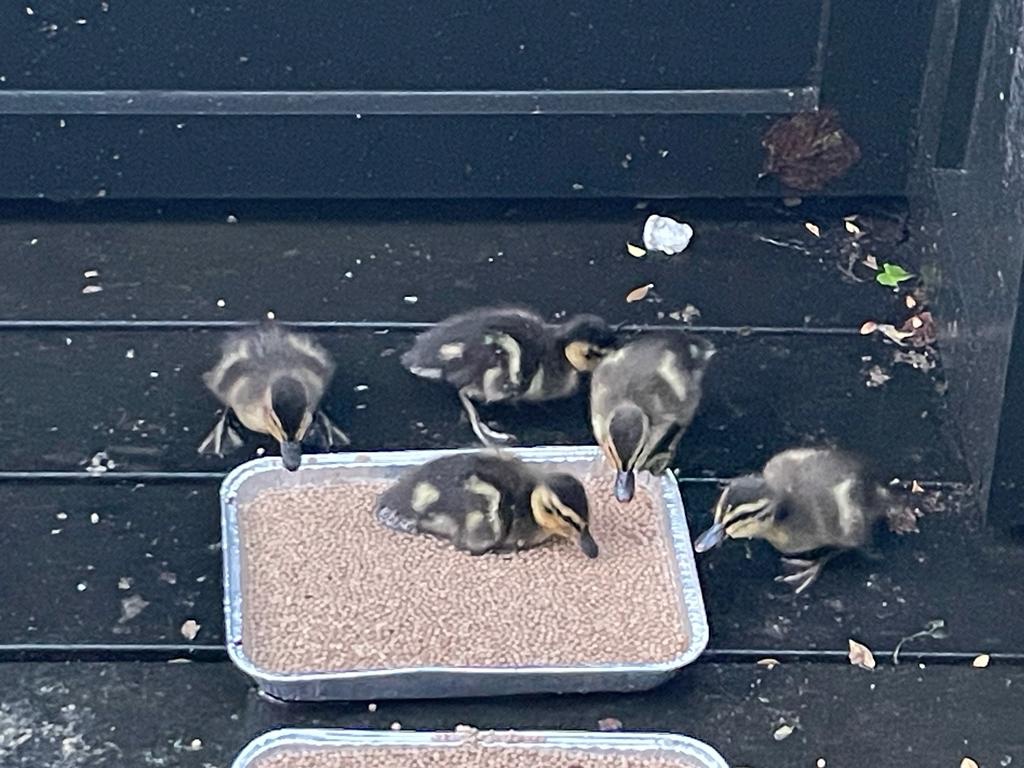 By Mia Antonini
By Mia Antonini
Two weeks ago, when nine mallard duck eggs hatched on their third-floor brownstone patio on West 77th Street, Cati and Alberto Antonini knew what NOT to do. Last summer, they had welcomed a different family of ducklings on the same patio. The Wild Bird Fund (WBF), a nonprofit wildlife center on Columbus Avenue and 87th Street, had instructed them not to bring the ducklings to Central Park, due to the danger of predators, like snapping turtles.

“The first year, I thought the duck and her ducklings had flown in,” Alberto told WSR. “But I quickly figured out those ducklings were not ‘flightworthy.’” He found the eggshells nestled under a shrub. The WBF explained to the family that mallard mothers don’t feed their young, making it difficult for them to survive in places like city terraces, where little nourishment is available. In true NYC fashion, WBF delivered dry bird-food pellets and spinach to the new caretakers by Uber Eats.
This year, the family picked up the feed themselves from WBF, also filling aluminum pans for the ducklings to drink and bathe in, which they jumped into with pleasure.
 At first, in the evenings, the mother frequently visited her ducklings, sitting on them to keep them warm and teaching them how to “prune” or waterproof themselves with their feathers.
At first, in the evenings, the mother frequently visited her ducklings, sitting on them to keep them warm and teaching them how to “prune” or waterproof themselves with their feathers.
 However, as they grew older, she often left them unattended for long periods of the night, making them vulnerable. Indeed, the number of ducklings shrunk from nine to five after only a few days. As explained by Emily Einhorn at the WBF, it is possible that the birds were taken by a predator, such as an owl or bald eagle. As the ducklings grew bigger and the mother’s visiting grew more inconsistent, it became clear that the patio was no longer the safest place for the ducklings, and the WBF advised for them to be brought into their sanctuary.
However, as they grew older, she often left them unattended for long periods of the night, making them vulnerable. Indeed, the number of ducklings shrunk from nine to five after only a few days. As explained by Emily Einhorn at the WBF, it is possible that the birds were taken by a predator, such as an owl or bald eagle. As the ducklings grew bigger and the mother’s visiting grew more inconsistent, it became clear that the patio was no longer the safest place for the ducklings, and the WBF advised for them to be brought into their sanctuary.
 Alberto managed to secure the ducklings in a box and brought them to the WBF, chirping the whole way. In the few minutes of handing off the ducklings, three other people came by the office with troubled wildlife: a pigeon stuck in a drainpipe, a sparrow with its head caught in a bird feeder (the feeder was removed in a quick minute!), and an unknown animal brought in through another animal rescue organization. According to Einhorn, in her three years at the WBF, this is the busiest summer she’s seen yet, including taking care of animals from peregrine falcons — a federally protected species — to baby squirrels.
Alberto managed to secure the ducklings in a box and brought them to the WBF, chirping the whole way. In the few minutes of handing off the ducklings, three other people came by the office with troubled wildlife: a pigeon stuck in a drainpipe, a sparrow with its head caught in a bird feeder (the feeder was removed in a quick minute!), and an unknown animal brought in through another animal rescue organization. According to Einhorn, in her three years at the WBF, this is the busiest summer she’s seen yet, including taking care of animals from peregrine falcons — a federally protected species — to baby squirrels.
Einhorn says that mallard ducks may choose to lay their eggs on patios because of the security they seem to offer from predators, though mothers often don’t consider the height of these structures, which is less than ideal, since ducklings often cannot fly until they are 50 or 60 days old. Now, the Antoninis must wait to see if another family will be joining them next year, a highly likely possibility.









Fascinating….and bravos to the Wild Bird sanctuary!
I count myself so very lucky to a neighbor and supporter of the Wild Bird Fund!! If we all contribute a little we shore up an incredibly important resource!!
Wild Bird Fund 😍😍😍
We saw (and heard) these babies and their mom across the yard! Kudos to this wonderful family for taking care of them.
I can’t say enough good things about the Wild Bird Fund. To whom I happily donated my “extra” money. A couple of winters ago I came across an unconscious red tailed hawk on 49th Street & Fifth Ave. It had apparently flown into one of the glass windows that had been vacated by the doll shop (they moved to Rock Center). The bird was alive but out cold. I stopped and stood over the bird to keep bikes and others from squishing it. Stopped a few other folks. We wound up with about 10 people. One bought a cheap scarf from a vendor to cover it to not lose its heat. I checked its breathing. There was some blood by its beak. Someone else called While Bird Fund. And they bring him to us immediately. As I was headed to a meeting I had to go but someone else stepped up to grab the bird. Police had come by with a kennel box. And off they went. I checked on that bird every day.
He lived. And was released some 10 days later.